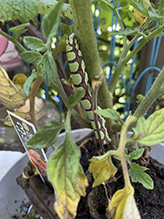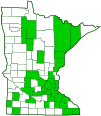Abbott’s sphinx
(Sphecodina abbottii)
Conservation • Description • Habitat • Ecology • Distribution • Taxonomy
|
||||||||
| Hodges # | 7870 |
|||||||
Conservation Status |
||||||||
| IUCN Red List | not listed |
|||||||
| NatureServe | N5 - Secure SNR - Unranked |
|||||||
| Minnesota | not listed |
|||||||
Description |
||
Abbott’s sphinx is a large moth but a small sphinx moth. It occurs in the United States and southern Canada east of the Great Plains. It is not uncommon in Minnesota. It is found in fields and woodlands, and at forest edges. Larvae are active day and night. Adults are active at night, beginning at dusk. Adults are 1 3⁄16″ to 1 9⁄16″ (30 to 40 mm) in length and have a 2″ to 2¾″ (51 to 70 mm) wingspan. The forewing is long with a smooth leading edge (costal margin) and a deeply scalloped outer margin. The inner margin is straight at the base, concave just near the outer margin. The upper side is a bark-like, longitudinally streaked pattern of violet-gray, dark brown, light brown, black, and tan. On each forewing there is a small, black, pale-bordered, discal spot. The basal and postmedial areas are dark, the median area is lighter. The hindwing is yellow at the base and along the leading and inner margins. At the tip of the abdomen there is a broad, three-pronged, brush of scales (caudal tuft). The caterpillar is up to 3″ (7.5 cm) long. Middle stage (instar) caterpillars are whitish to bluish-green. In place of the horn found on other sphinx caterpillars, there is a raised orange knob on the eighth abdominal segment (A8). Final instar caterpillars come in two color forms. The brown color form has longitudinal streaks of light and dark brown mimicking the color of a woody vine. The green form has on each abdominal segment a large, pale green, saddle-shaped spot on the upper side and a similar smaller spot on each side. The pattern is said to mimic a bunch of unripe grapes. Both forms have a black, raised, eye-like knob on A8 complete with a small white spot mimicking reflected light. |
||
Size |
||
Total length: 1 3⁄16″ to 1 9⁄16″ (30 to 40 mm) Wingspan: 2″ to 2¾″ (51 to 70 mm) |
||
Similar Species |
||
Habitat and Hosts |
||
Fields, woodlands, and forest edges Grapevines and virginia creeper |
||
Ecology |
||
Season |
||
One generation per year: Early May to early August |
||
Behavior |
||
The brown form caterpillar feeds at night and rests on a woody vine during the day. The green form caterpillar feeds day and night, and rests close to foliage. The adult is active at night, beginning at dusk, and will come to lights. During the day it rests on bark with its abdomen raised. With its cryptic coloration, it looks like a broken branch. |
||
Life Cycle |
||
|
||
Larva Hosts |
||
In Minnesota, only grapevines (vitis spp.) and virginia creeper (Parthenocissus spp.). In other areas, also peppervine (Ampelopsis spp.). |
||
Adult Food |
||
Flower nectar, tree sap flows, dung, and carrion. |
||
Distribution |
||||
|
Sources Biodiversity occurrence data published by: Minnesota Biodiversity Atlas (accessed through the Minnesota Biodiversity Atlas Portal, bellatlas.umn.edu, 7/21/2023). |
|||
| 7/21/2023 | ||||
Occurrence |
||||
|
||||
Taxonomy |
|||
Order |
Lepidoptera (Butterflies and Moths) | ||
Superfamily |
Bombycoidea (hawk, sphinx, emperor, and allied moths) | ||
Family |
Sphingidae (sphinx moths) | ||
Subfamily |
Macroglossinae | ||
Tribe |
Macroglossini | ||
Subtribe |
Macroglossina | ||
Genus |
Sphecodina | ||
Synonyms |
|||
|
|||
Common Names |
|||
Abbott’s sphinx |
|||
Glossary
Costal margin
The leading edge of the forewing of insects.
Instar
The developmental stage of arthropods between each molt; in insects, the developmental stage of the larvae or nymph.
Visitor Photos |
|||||
Share your photo of this insect. |
|||||
| This button not working for you? Simply email us at info@MinnesotaSeasons.com. Attach one or more photos and, if you like, a caption. |
|||||
Christine Stickland |
|||||
found this caterpillar on my back porch door step under the bird feeder. Put him/her next to new tomato plant and he/she crawled right up. What should I feed this thing? |
 |
||||
Molly and Robert Power |
|||||
Abbott's sphinx caterpillar There's a cyclops in our woods!! |
 |
||||
 |
|||||
MinnesotaSeasons.com Photos |
|||||
|
|||||

Slideshows |
||

Visitor Videos |
|||
Share your video of this insect. |
|||
| This button not working for you? Simply email us at info@MinnesotaSeasons.com. Attach a video, a YouTube link, or a cloud storage link. |
|||
Other Videos |
|||
| Abbott's Sphinx (Sphecodina abbottii) Carl Barrentine |
|||
About
Jun 7, 2013 This Abbott's Sphinx Moth (Sphenodina abbottii) warms-up in preparation for flight. Captured at the Turtle River State Park, North Dakota (06 June 2013) and photographed on 07 June 2013. |
|||
| Abbott's Sphinx Moth (Sphingidae: Sphecodina abbottii) Dorsal view, Warming-up Carl Barrentine |
|||
About
May 15, 2012 Photographed at the Turtle River State Park, North Dakota (15 May 2012). |
|||
| Abbott's sphinx caterpillar (Sphecodina abbottii) xojulia295ox |
|||
About
Jun 6, 2022 Thrashing anti-predator behavior |
|||
| Abbotts Sphinx S&K Wildflower Rescue Wildlife Habitat |
|||
About
Jul 6, 2019 ou never know what you are going to find in the garden these days. A first for us, an Abbott's Sphinx Moth caterpillar. |
|||

Visitor Sightings |
|||||
Report a sighting of this insect. |
|||||
| This button not working for you? Simply email us at info@MinnesotaSeasons.com. Be sure to include a location. |
|||||
| Kari Olson 6/24/2024 |
Location: McCleod County along the woods edge. So cool!!! |
|
|||
| Christine Stickland 7/20/2023 |
Location: Old Orchard Beach, Maine found this caterpillar on my back porch door step under the bird feeder. Put him/her next to new tomato plant and he/she crawled right up. What should I feed this thing? |
||||
| John valo 7/21/2023 |
According to HOSTS (from HOSTS - a Database of the World's Lepidopteran Hostplants, Natural History Museum, the hosts for this caterpillar are Parthenocissus quinquefolia (virginia creeper) Parthenocissus tricuspidata (Japanese creeper) vitis vinifera (wine grape) According to BugGuide.net, another host is Ampelopsis glandulosa (porcelain berry) One of these plants is probably in your area, hopefully near where you found the caterpillar. If so, the caterpillar's best chance to reach the next stage of life is on one of these plants. |
||||
| Molly and Robert Power 7/3/2022 |
Location: Albany, MN There's a cyclops in our woods!! |
||||
MinnesotaSeasons.com Sightings |
|||||
|
|||||

Created: 7/14/2022
Last Updated:

